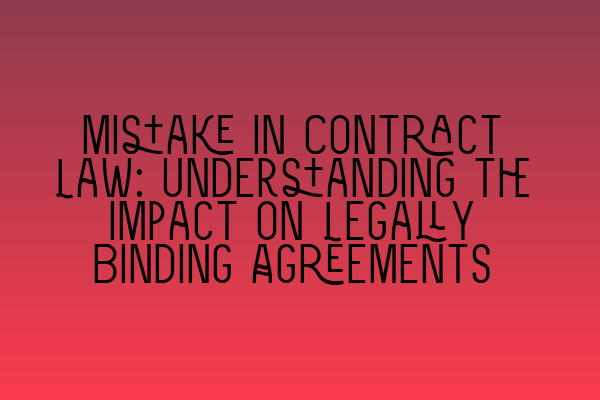Mistake in Contract Law: Understanding the Impact on Legally Binding Agreements
Contract law plays a vital role in governing business transactions and ensuring that agreements are legally binding. However, despite the care and attention that goes into preparing contracts, mistakes can still occur. These mistakes can have a significant impact on the enforceability and validity of contract terms, potentially leading to disputes between parties.
In this article, we will explore the concept of mistakes in contract law and their implications. We will discuss different types of mistakes, such as mutual mistake, unilateral mistake, and mistakes regarding the terms of the contract. Understanding these mistakes is essential for both solicitors and individuals entering into contracts to protect their rights and interests.
1. Mutual Mistake
A mutual mistake occurs when both parties to a contract have a mistaken understanding of a fundamental fact essential to the agreement. The mistake must relate to a fundamental aspect of the contract, and it must be sufficiently material to render the contract unenforceable. For example, if both parties agree to buy and sell a specific painting, but it later turns out that the painting was destroyed before the contract was formed, the contract may be void due to a mutual mistake.
Understanding the concept of mutual mistake is crucial as it can provide grounds to rescind or terminate a contract. As a solicitor, having a thorough knowledge of the law surrounding mutual mistakes can help you protect your clients’ rights and interests.
2. Unilateral Mistake
Unlike mutual mistakes, unilateral mistakes occur when only one party to a contract has made an erroneous assumption about a fact material to the agreement. In such cases, the mistaken party may seek relief from the contract by claiming that they would not have entered into the contract if they had known the true facts. However, proving a unilateral mistake can be challenging, as the mistaken party must demonstrate that the mistake was significant and that the other party either knew or should have known about the mistake.
Solicitors specializing in contract law need to be well-versed in unilateral mistakes and the legal principles surrounding them. By thoroughly understanding this concept, they can effectively represent their clients’ interests and navigate the complexities of contract disputes.
3. Mistakes Regarding the Terms of the Contract
In addition to mutual and unilateral mistakes, mistakes regarding the terms of the contract can also impact the enforceability of an agreement. These mistakes typically involve errors in drafting or conveying the terms and conditions of the contract. For instance, if the contract states an incorrect price or fails to include vital terms agreed upon by both parties, it may be subject to challenge and potential invalidation.
As a solicitor, it is crucial to meticulously review and draft contracts to ensure their accuracy and coherence. Implementing best practices, such as conducting thorough contract reviews and using clear and precise language, can help mitigate the risk of mistakes regarding the terms of the contract.
Conclusion
Mistakes in contract law can have significant implications, affecting the enforceability and validity of legally binding agreements. Understanding the various types of mistakes, including mutual mistake, unilateral mistake, and mistakes regarding the terms of the contract, is essential for both solicitors and individuals entering into contracts.
If you are considering a career in contract law, it is crucial to gain a comprehensive understanding of contract principles and the potential pitfalls that can arise. Specializing in contract law can offer you a rewarding and fulfilling legal career, where you can assist clients in navigating complex transactions and resolving disputes.
For further insights into the legal profession and related topics, we recommend checking out these articles:
- Barrister vs. Solicitor: A Comprehensive Comparison
- Exploring Different Solicitor Specializations: Finding Your Niche
- Embracing the Rise of Virtual Law Practices
- Navigating the Maze: Demystifying Ethical Responsibilities of Solicitors
- Unveiling Real-Life Case Studies: Insights into Legal Practice and Decision-Making
